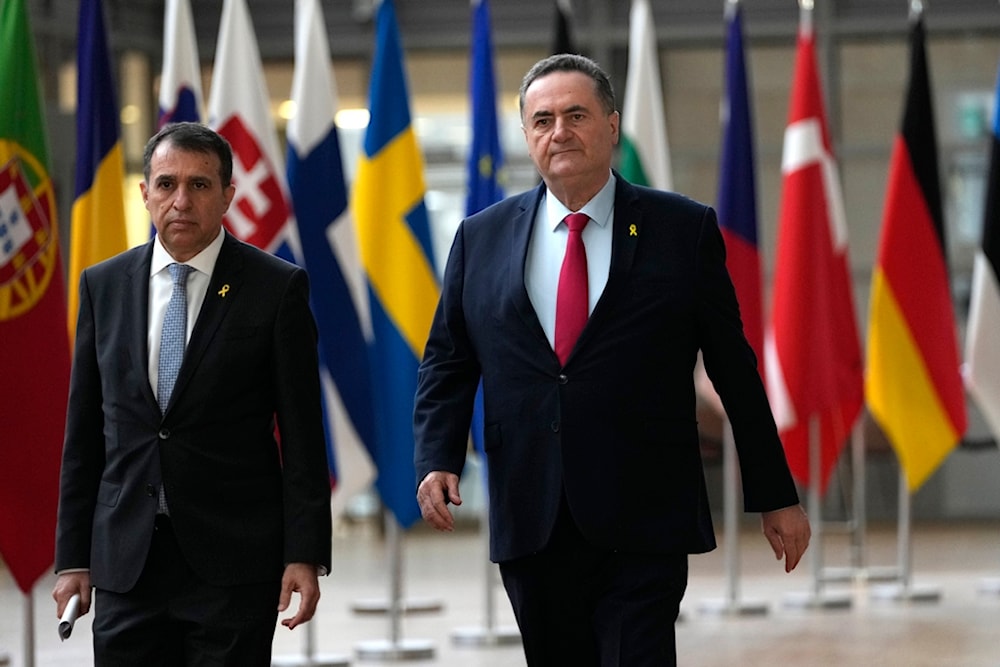EU Foreign Ministers baffled by Israeli artificial Island proposal
The Israeli envoy reportedly suggested sending all Palestinians to an artificial island off the Gaza Strip.
-

"Israel's" Foreign Minister Israel Katz, right, arrives for a meeting of EU foreign ministers at the European Council building in Brussels, Monday, Jan. 22, 2024 (AP)
In a recent meeting of EU foreign ministers, "Israel's" Foreign Minister Israel Katz faced disappointment as he suggested relocating Palestinians to an artificial island off Gaza.
The proposal, originally presented in 2017 during Katz's tenure as transport minister, failed to gain traction among the ministers, who continued discussions on the Middle East peace plan.
Sources reveal that the ministers were visibly dismayed by Katz's absurd suggestion, with one stating, "Ministers ignored it and went ahead with what they were there to talk about. Nobody engaged with it."
Read more: Europe's global reputation damaged by stance on Gaza: Politico
On the Palestinian side, Foreign Minister Riyad al-Maliki rejected Katz's proposal and emphasized the urgent need for a ceasefire in Gaza.
Al-Maliki called on his EU counterparts to condemn Israeli Prime Minister Benjamin Netanyahu's recent opposition to the creation of a Palestinian state and consider sanctions against him.
Speaking to the ministers, al-Maliki pointed to the EU's responsibility in promoting peace in the region, noting: "I think the collective responsibility of the EU right now lies in this particular moment is that they have to show leadership and courage, and really to take the right position. I will say it very openly, very clearly to my European colleagues. I expect from you to call for a ceasefire and to work for it. I expect from you to condemn the statement that was made by Netanyahu about rejecting the two-state solution. I expect from you to start contemplating sanctions against Netanyahu."
"The life of Palestinians really matters, and we cannot accept that, you know. The life of Palestinian children is being really treated less than the life of children anywhere in the world. This is really very essential and very important."
Read more: Netanyahu: There can be no Palestinian state
This comes against the backdrop of heightened tensions regarding the preconditions imposed by Saudi Arabia to reach a normalization agreement with "Israel."
The Gulf country has reiterated multiple times and through multiple diplomatic cables that the only obstacle standing in the way of normalizing relations with the Israeli regime would involve the establishment of a Palestinian state.
As a result of this, the West has been pressuring "Israel" to comply with Saudi demands, but Israeli Prime Minister Benjamin Netanyahu has been the source of frustration among allies by consistently opposing the two-state solution.
Earlier in the day, EU Foreign Policy Chief Josep Borrell stated that the EU exclusively supports the UN-backed two-state solution as the acceptable peace process in the Gaza Strip.
"I think that we have to stop talking about the peace process and start talking more concretely about the two-state solution process. Because 'peace' — it could be many different peaces, what kind of peace you are talking about? So let's talk about what we want to do, and what we want to do is to build a two-state solution. The way of naming it is important. So from now on I will not talk about the peace process, but I will talk about the two-state solution process," Borrell told journalists ahead of the council.
"If they do not agree [Israelis on the two-state solution], we have to discuss. That is why we are here, we have to discuss even if they disagree. They have to come here and they will discuss with us and we will study which solution they have in mind," Borrell said.
On Sunday, a report by the Financial Times revealed that a document that was circulated ahead of today's meeting asked member-states to draft potential consequences for "Israel" in case the latter fails to embrace the two-state solution.

 4 Min Read
4 Min Read








